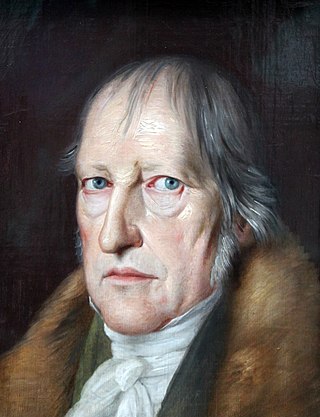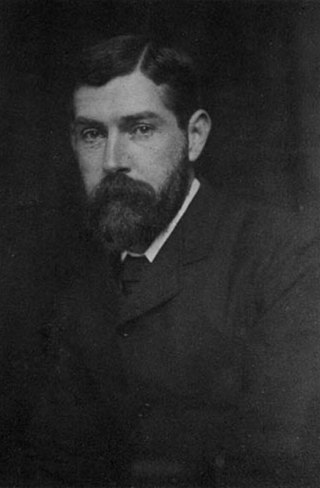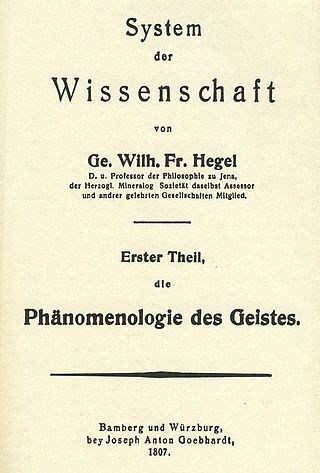Related Research Articles
In ontology, the theory of categories concerns itself with the categories of being: the highest genera or kinds of entities according to Amie Thomasson. To investigate the categories of being, or simply categories, is to determine the most fundamental and the broadest classes of entities. A distinction between such categories, in making the categories or applying them, is called an ontological distinction. Various systems of categories have been proposed, they often include categories for substances, properties, relations, states of affairs or events. A representative question within the theory of categories might articulate itself, for example, in a query like, "Are universals prior to particulars?"

Georg Wilhelm Friedrich Hegel was a German philosopher. He is one of the most important figures in German idealism and one of the founding figures of modern Western philosophy. His influence extends across the entire range of contemporary philosophical topics, from metaphysical issues in epistemology and ontology, to political philosophy, the philosophy of history, philosophy of art, philosophy of religion, and the history of philosophy.

In philosophy, the term idealism identifies and describes metaphysical perspectives which assert that reality is indistinguishable and inseparable from perception and understanding; that reality is a mental construct closely connected to ideas. Idealist perspectives are in two categories: subjective idealism, which proposes that a material object exists only to the extent that a human being perceives the object; and objective idealism, which proposes the existence of an objective consciousness that exists prior to and independently of human consciousness, thus the existence of the object is independent of human perception.

Continental philosophy is a term used to describe some philosophers and philosophical traditions that do not fall under the umbrella of analytic philosophy. However, there is no academic consensus on the definition of continental philosophy. Prior to the twentieth century, the term "continental" was used broadly to refer to philosophy from continental Europe. A different use of the term originated among English-speaking philosophers in the second half of the 20th century, who used it to refer to a range of thinkers and traditions outside the analytic movement. Continental philosophy includes German idealism, phenomenology, existentialism, hermeneutics, structuralism, post-structuralism, deconstruction, French feminism, psychoanalytic theory, and the critical theory of the Frankfurt School as well as branches of Freudian, Hegelian and Western Marxist views.
The Library of Living Philosophers is a series of books conceived of and started by Paul Arthur Schilpp in 1939; Schilpp remained editor until 1981. The series has since been edited by Lewis Edwin Hahn (1981–2001), Randall Auxier (2001–2013), and Douglas R. Anderson (2013–2015). The Library of Living Philosophers is currently edited by Sarah Beardsworth (2015-present). Each volume is devoted to a single living philosopher of note, and contains, alongside an "intellectual autobiography" of its subject and a complete bibliography, a collection of critical and interpretive essays by several dozen contemporary philosophers on aspects of the subject's work, with responses by the subject. The Library was originally conceived as a means by which a philosopher could reply to their interpreters while still alive, hopefully resolving endless philosophical disputes about what someone "really meant." While its success in this line has been questionable—a reply, after all, can stand just as much in need of interpretation as an original essay—the series has become a noted philosophical resource and the site of much significant contemporary argument.

A subset of absolute idealism, British idealism was a philosophical movement that was influential in Britain from the mid-nineteenth century to the early twentieth century. The leading figures in the movement were T. H. Green (1836–1882), F. H. Bradley (1846–1924), and Bernard Bosanquet (1848–1923). They were succeeded by the second generation of J. H. Muirhead (1855–1940), J. M. E. McTaggart (1866–1925), H. H. Joachim (1868–1938), A. E. Taylor (1869–1945), and R. G. Collingwood (1889–1943). The last major figure in the tradition was G. R. G. Mure (1893–1979). Doctrines of early British idealism so provoked the young Cambridge philosophers G. E. Moore and Bertrand Russell that they began a new philosophical tradition, analytic philosophy.

Bernard Bosanquet was an English philosopher and political theorist, and an influential figure on matters of political and social policy in the late 19th and early 20th centuries. His work influenced but was later subject to criticism by many thinkers, notably Bertrand Russell, John Dewey and William James. Bernard was the husband of Helen Bosanquet, the leader of the Charity Organisation Society.

Ernst Alfred Cassirer was a German philosopher. Trained within the Neo-Kantian Marburg School, he initially followed his mentor Hermann Cohen in attempting to supply an idealistic philosophy of science.
Percy Brand Blanshard was an American philosopher known primarily for his defense of reason and rationalism. A powerful polemicist, by all accounts he comported himself with courtesy and grace in philosophical controversies and exemplified the "rational temper" he advocated.

The Phenomenology of Spirit is the most widely-discussed philosophical work of Georg Wilhelm Friedrich Hegel; its German title can be translated as either The Phenomenology of Spirit or The Phenomenology of Mind. Hegel described the work, published in 1807, as an "exposition of the coming to be of knowledge". This is explicated through a necessary self-origination and dissolution of "the various shapes of spirit as stations on the way through which spirit becomes pure knowledge".

Absolute idealism is an ontologically monistic philosophy chiefly associated with G. W. F. Hegel and Friedrich Schelling, both of whom were German idealist philosophers in the 19th century. The label has also been attached to others such as Josiah Royce, an American philosopher who was greatly influenced by Hegel's work, and the British idealists.

In late modern continental philosophy, neo-Kantianism was a revival of the 18th-century philosophy of Immanuel Kant. The Neo-Kantians sought to develop and clarify Kant's theories, particularly his concept of the "thing-in-itself" and his moral philosophy.
John Henry Muirhead was a British philosopher best known for having initiated the Muirhead Library of Philosophy in 1890. He became the first person named to the Chair of Philosophy at the University of Birmingham in 1900.

Philosophical anthropology, sometimes called anthropological philosophy, is a discipline dealing with questions of metaphysics and phenomenology of the human person.

John Niemeyer Findlay, usually cited as J. N. Findlay, was a South African philosopher.
The International Library of Psychology, Philosophy and Scientific Method was an influential series of monographs published from 1922 to 1965 under the general editorship of Charles Kay Ogden by Kegan Paul, Trench Trubner & Co. in London. This series published some of the landmark works on psychology and philosophy, particularly the thought of the Vienna Circle in English. It published some of the major psychologists and philosophers of the time, such as Alfred Adler, C. D. Broad, Rudolf Carnap, F. M. Cornford, Edmund Husserl, Carl Jung, Kurt Koffka, Ernst Kretschmer, Bronisław Malinowski, Karl Mannheim, George Edward Moore, Jean Nicod, Jean Piaget, Frank P. Ramsey, Otto Rank, W. H. R. Rivers, Louis Leon Thurstone, Jakob von Uexküll, Hans Vaihinger, Edvard Westermarck, William Morton Wheeler, Ludwig Wittgenstein, J. N. Findlay and others. Most of the 204 volumes in the series have been reprinted, some in revised editions.
Metaphysics is the branch of philosophy that investigates principles of reality transcending those of any particular science. Cosmology and ontology are traditional branches of metaphysics. It is concerned with explaining the fundamental nature of being and the world. Someone who studies metaphysics can be called either a "metaphysician" or a "metaphysicist".

Eugen Fink was a German philosopher.
John Russon is a Canadian philosopher, working primarily in the tradition of Continental Philosophy. In 2006, he was named Presidential Distinguished Professor at the University of Guelph, and in 2011 he was the Shastri Indo-Canadian Institute's Canadian Lecturer to India.

The following list of works by German philosopher Georg Wilhelm Friedrich Hegel (1770–1831).
References
- ↑ George Edward Moore, Commonplace Book, 1919-1953, Vol. 16, London: Routledge, 2002 (reprint) (Muirhead Library of Philosophy), publisher's advertisement in final page.
- ↑ Muirhead Library of Philosophy (95 volumes), routledge.com. Retrieved 5 January 2019.